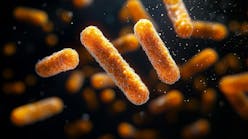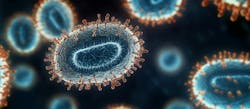Clinical trial of antibody therapy for COVID-19 enrolling participants
An international randomized, controlled Phase 3 clinical trial has begun evaluating the safety and efficacy of an investigational long-acting antibody combination for treating people hospitalized with COVID-19, according to a press release from the National Institutes of Health
The trial, part of a master protocol known as ACTIV-3, has an adaptive design allowing investigators to add new sub-studies of additional investigational agents. ACTIV-3 is sponsored by the National Institute of Allergy and Infectious Diseases (NIAID), part of NIH.
The new sub-study is evaluating AZD7442, an investigational long-acting antibody combination developed by biopharmaceutical company AstraZeneca (Cambridge, UK).
This investigational long-acting antibody combination might function both as a treatment and as a means of preventing infection with SARS-CoV-2. However, the ACTIV-3 trial will only be testing its efficacy as a therapeutic.
ACTIV-3 is part of the NIH Accelerating COVID-19 Therapeutic Interventions and Vaccines (ACTIV) public-private partnership to develop a coordinated research strategy for prioritizing and accelerating development of the most promising treatments and vaccines. The ACTIV-3 master trial is designed to conduct multiple different trials of experimental therapeutics simultaneously.
The new sub-study of AZD7442 will be running concurrently with two other sub-studies. One sub-study is evaluating VIR-7831, a SARS-CoV-2 experimental monoclonal antibody developed through a partnership between GlaxoSmithKline (Brentford, UK) and Vir Biotechnology. (San Francisco). The other ongoing sub-study is evaluating the combination of BRII-196 and BRII-198, two investigational SARS-CoV-2 neutralizing monoclonal antibodies manufactured by Brii Biosciences (Durham, NC, and Beijing).
Initial participants in the new ACTIV-3 sub-study will be hospitalized patients with mild-to-moderate COVID-19 and fewer than 13 days of symptoms. They will be randomized to receive either a saline placebo control or one of the three experimental therapeutics. After five days, the participants’ medical condition will be assessed on two seven-point ordinal scales, each ranging from being able to undertake usual activities with minimal or no symptoms to death.
If the ordinal outcomes assessed at five days, after approximately 150 volunteers have received AZD7442, indicate that AZD7442 is likely to be both safe and effective, enrollment in the trial will be expanded. At that time, an additional 700 participants, some of whom may have more severe cases of COVID-19, will be enrolled and randomized in the trial. This expanded pool of participants will allow researchers to better evaluate whether the therapeutic fulfills the trial’s primary endpoint of sustained recovery. Participants will have met this endpoint when they have been discharged from the hospital and have lived at home for 14 consecutive days.





